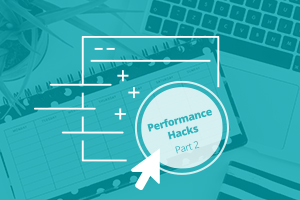Performance Hacks, Part 2: Time to Shine! Setting Up Campaign Schedules
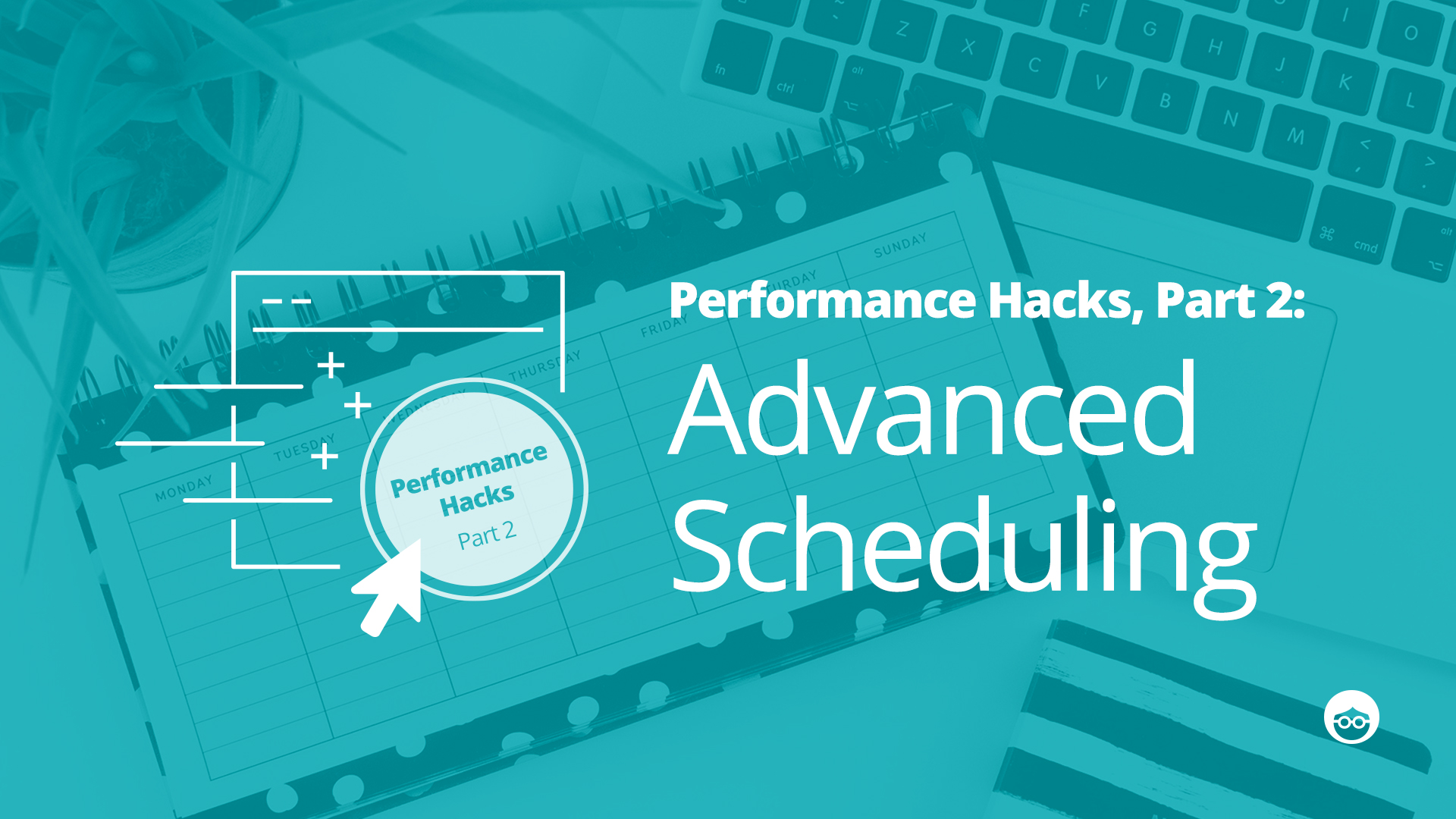
What are Campaign Schedules and Why Should You Use Them?
Now that you know how to take control of where your ads are served, let’s walk through how you can control when they are served.
Have you ever woken up on the wrong side of the bed? Well, your campaign might have too! Like many of us, campaigns can behave differently at different times of the day or days of the week. That’s because as consumers we tend to have unique content consumption habits, meaning we’re browsing the web, making purchases and doing other activities online at different times based on our own schedules.
There are many factors that contribute to our purchase behaviors and when we’re most receptive to advertisements. According to a study by Aki Technologies, younger generations are most receptive to ads while watching TV and right before sleep. Identifying your core audience will help you understand when it’s best to serve ads from your campaign.
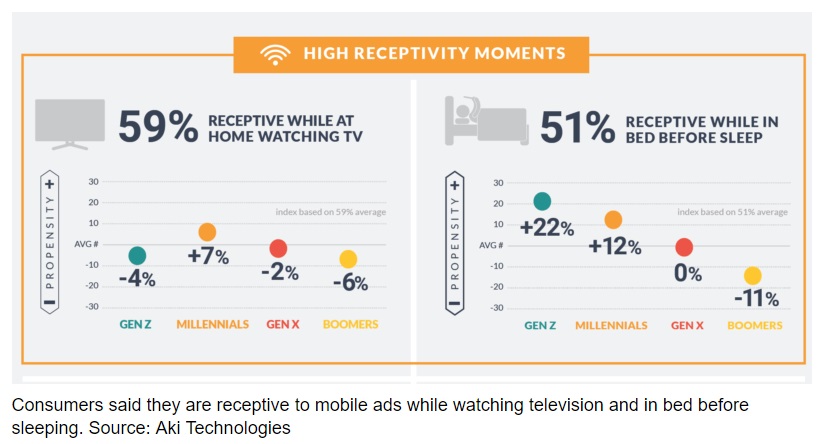
When setting up an advertising campaign, you’ll want to consider the specifics of when your ads will run. Do your customers tend to convert during specific days of the week? Do you notice trends in hours of the day when users engage most or, conversely, when clicks drop off? Identifying the right schedule for your business or product will help increase the success of your campaigns.
Campaign schedules allow advertisers to adjust when campaigns are live throughout different times of the week. This is an essential tactic for marketers as it enables you to promote campaigns during specific times that can have a positive impact on performance and reduce the amount of traffic on less desirable times where performance is poor.
Here are a few examples:
- A performance marketer is driving email sign-ups for an auto insurance lead generation campaign. Auto insurance call centers operate during traditional business hours (8-5pm) so in order to keep their campaigns efficient, they need to serve ads within those same business hours. Otherwise, there won’t be any operators to answer calls from prospective buyers.
- A digital-first dog food business notices that most conversions occur between 6-10pm Monday-Thursday. They increase their CPCs during those hours to increase the amount of traffic towards high-converting users.
It’s important to know the specifics that each advertising platform offers in order to make the right decisions for your campaigns. For example, most ad platforms allow advertisers to select specific hours of campaign activity while some only allow you to adjust the start and end time of your campaign. Facebook allows users to daypart, but only when using lifetime budgets, while Taboola only allows you to adjust your campaign’s schedule and not CPC by hour.
In this article, we’ll walk you through Outbrain’s advanced scheduling feature and how you can use it to achieve maximum performance results.
Here’s the nitty gritty:
Advanced scheduling techniques in the Outbrain dashboard allow you to adjust when your ads get displayed throughout our premium publisher network. Scheduling takes into account the hours of day your campaign is live and the days of the week your campaign is active. You can also change the CPC by hour to really hone in on peak hours where you audience has strong purchasing habits.
- You can adjust hours of activity per day of the week.
- Manage the hours in which your campaign is live.
- Bonus! Change your CPC per hour of day or day of week.
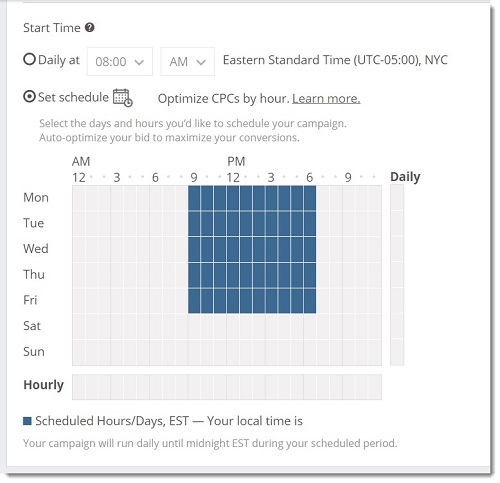
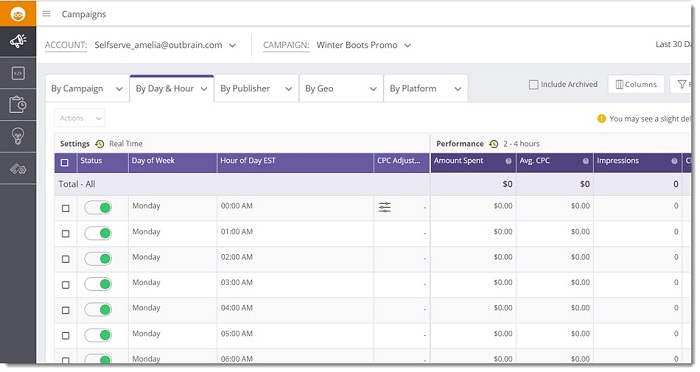
How can performance marketers leverage advanced scheduling tactics?
Starting out, it’s always best to launch campaigns on a 24/7 schedule until you have a strong enough data set to identify trends. If you’re new to Outbrain, you may want to wait a few weeks before making big changes such as shutting off large chunks of time from receiving traffic.
Once you have the data to pin down your audience’s behavior, we recommend starting off by adjusting CPCs per hour to give campaigns a boost in traffic when you know consumers are most active. If strong trends persist for your business or Outbrain-specific data, we recommend implementing more granular adjustments to further hone in on peak hours.
Next steps in optimizations would be to trim away poor performing hours from your day, or make bulk changes to CPC per day of the week (where you allocate stronger CPCs to high-converting days, and lower CPCs for poor-performing days).
- 💡Pro Tip: Make sure you’re viewing reports at the time of conversion to best understand when consumers are engaging with your content.
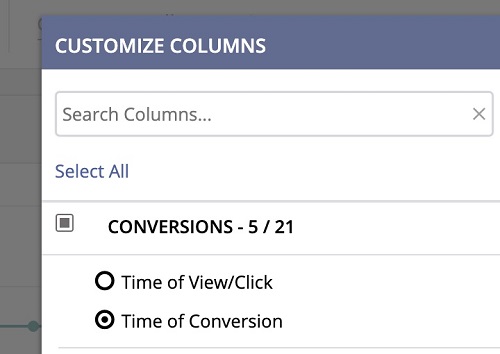
Data can be assessed at an account or campaign level depending on your specific business. Once you understand which days of week perform best, you can start making optimizations. We always recommend making gradual changes so you can learn with your new strategies and digest the data from your adjustments.
- 💡Pro Tip: When identifying trends by hour or day of week, it’s best to review engagement metrics (CTR, CVR) to understand when your audience is clicking and converting. For example: If Sundays have stronger conversion rates, increase CPCs on Sundays to secure more traffic.
Looking for Tips & Tricks?
- It’s important to ensure your data set is strong enough before cutting out hours of the day or full days of the week. You don’t want to miss out on potential converters!
- Utilize CPC by hour of day and day of week adjustments to control poor performing days and hours instead of turning them off entirely.
- Be sure to give your campaign enough time to ramp up when launching. For example, if your peak hours of traffic start at 8am, launch your campaigns at 7am so they are fully ramped up by 8am.
- Note: Campaigns require at least an hour to start serving at full force. If your campaign goes live at your peak hour, it may not serve enough to capture the desired amount of traffic or users.
- Scheduling options are shown in EST so adjust your times to accommodate different time zones.
- Keep in mind, traffic surges on most ad networks during peak hours of content consumption. If most of your customers are engaging and converting with your content on their lunch breaks, there’s a good chance other consumers are too.
Now that you’re equipped with some fresh performance hacks, get into the dashboard and start optimizing, or if you’re new to Outbrain, contact us to get started on a new campaign.
And stay tuned for next month’s article in the Performance Hacks series, fresh off the press with hot tips and hacks for performance marketers on Outbrain.
Scroll up and subscribe to our blog to get our top blog posts straight to your inbox.
